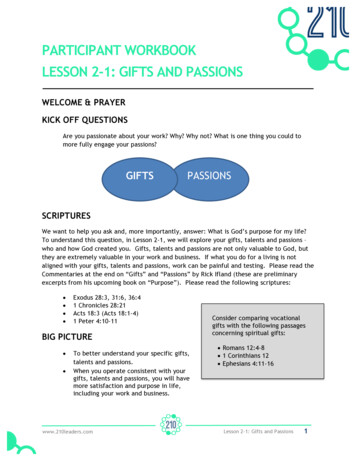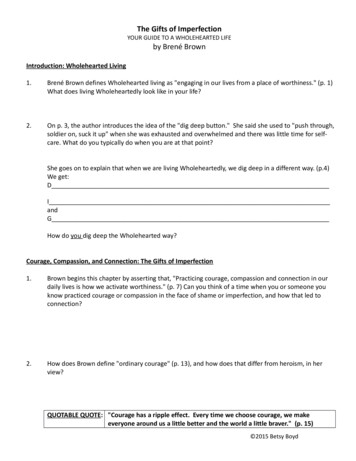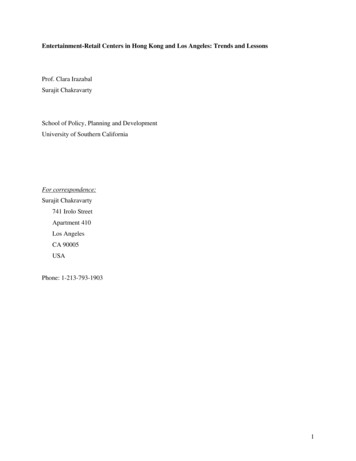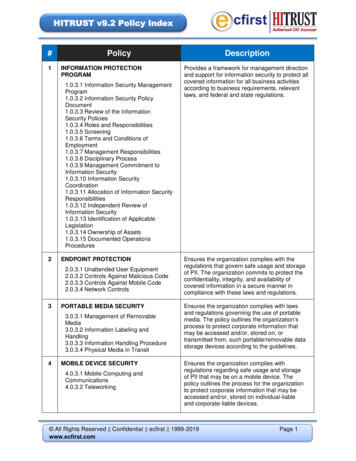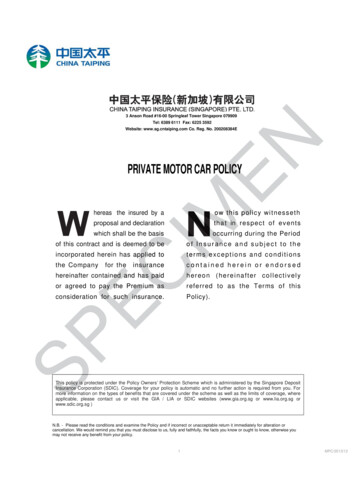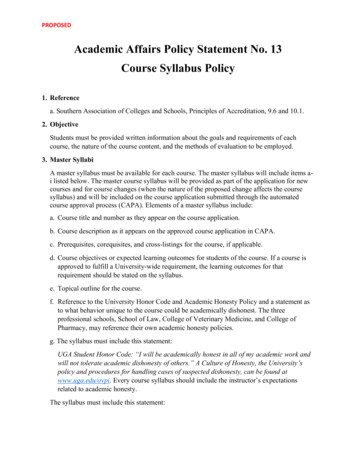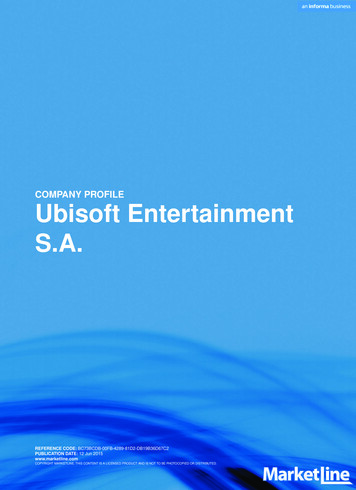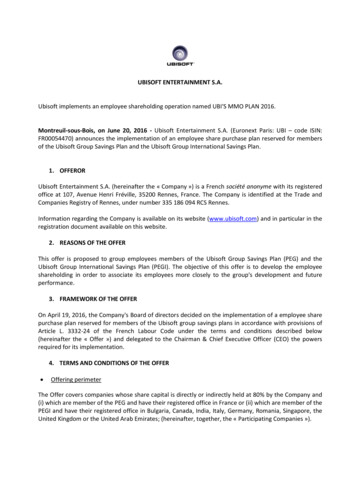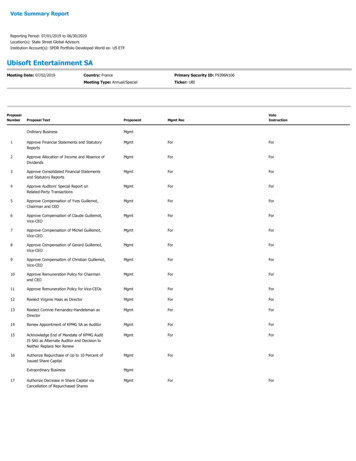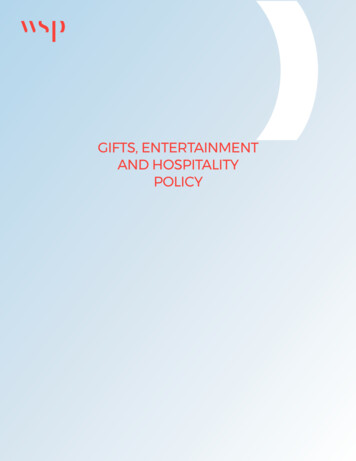
Transcription
GIFTS, ENTERTAINMENTAND HOSPITALITYPOLICY
TABLE OFCONTENTSGIFTS, ENTERTAINMENT AND HOSPITALITYPOLICY . 3Introduction . 3Gifts, entertainment and hospitality . 3Assessing acceptability . 4Registration and approval process . 6Common dilemmas . 6Where to turn for help .7Reporting suspected violations .7wsp.compage 2
GIFTS, ENTERTAINMENT AND HOSPITALITY POLICYPOLICY ADOPTED MARCH 2015, REVISED FEBRUARY 2017,MARCH 2019 AND MAY 2020INTRODUCTIONThis Gifts, Entertainment and Hospitality Policy (the “Policy”) concerns WSP Global Inc. and its subsidiaries(collectively, the “Corporation”) and applies to all employees of the Corporation, without exception. Thisincludes the President and Chief Executive Officer, officers, vice presidents, directors and other managers, all staffemployed with the Corporation and affiliated companies and members of the board of directors (collectively, the“Employees”).This document is to be read together with the Code of Conduct (the “Code”) and its underlying policies.All of the terms in this Policy have the same meaning as those defined in the Code.GIFTS, ENTERTAINMENT AND HOSPITALITYTHE CORPORATION’S POLICYThe Corporation recognizes and accepts that the occasional offer/acceptance of a modest gift, entertainment orhospitality (“GEH”) can make a valuable contribution to the development and maintenance of good businessrelationships. However, Employees may not solicit, give or receive, either directly or indirectly, GEH in relation toan individual or company with which it does business if the benefit could unduly influence the judgment of therecipient by creating a disproportionate obligation to return the favour or by creating an appearance ofimpropriety. Employees need to be careful and assess what is expected in return when a GEH is offered. If the GEHplaces either party under an obligation, or appears to do so, then there is a problem. A GEH that is designed toinfluence a business decision in the Corporation’s favour is not a GEH: it is a bribe.The Corporation’s integrity principles apply equally to business courtesies exchanged with both government andprivate sector counterparts. Employees are expected to exercise good judgment and, if in doubt, may seek advicefrom senior managers or the regional Ethics and Compliance representative.TYPES OF GIFTS, ENTERTAINMENT AND HOSPITALITYThis Policy covers the following types of business courtesies exchanged with external parties:—Gifts – any type of gift, whether pecuniary or not and including personal gifts.—Entertainment – attendance at social, cultural or sporting events.—Hospitality – meals, drinks, as well as lodging and travel expenses.Anti-corruption laws cover donations or gifts of goods and services as well as cash. For more information onbribery and anti-corruption, Employees can consult the Corporation’s Anti-Corruption Policy.wsp.compage 3
REGIONAL CONSIDERATIONSEmployees should always make sure that they know which rules apply in the country where they are workingThese rules are notably included in regional GEH guidelines.Regional GEH guidelines also set out the specific monetary value of acceptable modest GEH and the acceptablecumulative value of GEH exchanged with the same person over a 12-month period.Regional GEH guidelines can be requested from any local senior manager or the regional Ethics and Compliancerepresentative. Employees may not accept or offer GEH that exceeds regional GEH value thresholds withoutcomplying with approval and registration requirements.THIRD PARTY POLICIESThe other party involved in an exchange, such as a client, may be subject to more restrictive gifts, entertainmentand hospitality policies than those of WSP. If you have any questions in this regard or believe that you are dealingwith a third party with particularly complex policies, please contact your manager or your regional Ethics andCompliance representative for interpretation and guidance.SPECIAL CONSIDERATIONS FOR PUBLIC OFFICIALSPublic officials include representatives of the government, civil servants, and employees of state-owned or statecontrolled entities. Particularly strict anti-corruption laws mean that extra caution is required when dealing withpublic officials. Indeed, public officials may themselves be subject to especially tight guidelines that must berespected. For instance, in some countries, government officials are not permitted to accept a cup of coffee or alight meal from a business counterpart.ASSESSING ACCEPTABILITYCHECKING THE “TRAFFIC LIGHT”When assessing what is and is not acceptable, Employees may find it helpful to think of a three-part “trafficlight”:UNACCEPTABLEThe following examples are never acceptable:—Anything illegal;—Cash or cash equivalents, such as gift vouchers, shares, or other items redeemable for cash, regardless of theamount involved;—Anything that is extravagant or not commensurate with the occasion;—Anything that could affect or appear to affect the recipient’s business judgment;—Anything that is counter to the Corporation’s principles and ethical business practices (e.g., sexual favours,and events at sexually oriented clubs);—Anything offered to someone who is about to make a business decision for the Corporation, for example theaward of a contract;wsp.compage 4
—Anything that would damage the Corporation’s reputation if publicly reported, either locally orinternationally;—Anything that contravenes the recipient’s internal rules and standards, including government officials whoin many countries are themselves subject to particularly stringent regulation (see above on government andpublic officials);—Any gift or benefit that has to be kept secret from other colleagues, an employee’s immediate manager or anyother relevant parties.NEEDS SPECIAL CONSIDERATIONThe following examples may be acceptable, but require special consideration, and must be authorized.—Travel expenses of third parties involving flights and overnight stays;—The inclusion of partners at corporate hospitality events;—Invitations to particularly expensive cultural or sporting events, such as World Cup finals;—Gifts on special occasions, such as births and weddings.In cases where the GEH places either party under an obligation, or where the exchange is (or appears to be) anattempt to influence a business decision, it should not be offered or accepted.NORMALLY ACCEPTABLEThe following are normally acceptable when given to private third parties:—Token seasonal gifts, where such gifts are a common cultural feature and the value of the modest gift iswithin the Company’s financial limits;—Modest, occasional meals with a business partner that fall within the Company’s financial limits;—Small corporate, promotional gifts, for example pens marked with the company logo and similar items;—Occasional attendance at ordinary sporting or cultural events such as theatre performances or concerts;THINKING AHEADValue is not the only consideration. Employees must also take into account the need to avoid anything that couldbe seen as an undue influence even if the gift is of low value. In addition, Employees need to consider thefrequency and cumulative value of exchanges with the same recipient. It is not acceptable to keep offering GEH tothe same recipient or receive repeated GEH from the same donor, even if each individual gift is of low value.Employees should think ahead about the patterns of cultural and business behaviour that apply in countrieswhere they work.Similarly, Employees should ensure that business partners, including contractors bidding for business,understand and are aware of the Corporation’s policies and have been provided with a copy of the Third Party Codeof Conduct and other relevant documentation, as set out in the Corporation’s Working with Third Parties Policy.LOOKING FOR RED FLAGSWarning signs include the following:—wsp.compage 5
—Where an Employee comes under pressure to offer or accept a GEH because this is how things are done in thecountry where they are working. Local practice may not be acceptable internationally. For example, in somecountries, it is common for contractors to offer “thank you gifts” to office staff who commission theirservices. The Corporation does not accept these practices.—An official or a business partner drops a hint that a particular favour might make him/her look on theCorporation more favourably.Employees should not wait for problems to occur. If in doubt, advice may be sought from senior managers or theregional Ethics and Compliance representative.REGISTRATION AND APPROVAL PROCESSAll GEH of a value exceeding the regional threshold set out in regional GEH guidelines must be approved andrecorded in the Corporation’s GEH registry. Approval and registration requirements should additionally followthese rules:—Managers who approve business courtesy exchanges or review expense claims must have more senioritythan the Employee submitting the request or claim.—When WSP offers GEH, the most senior WSP Employee present is responsible for paying any onsite costs (e.g.with a company credit card) and for ensuring approval and registration in accordance with regional GEHguidelines.—When WSP receives GEH, the employee who receives it has the responsibility of seeking approval andregistering the GEH in accordance with regional GEH guidelines, even if it is subsequently shared withcolleagues.The registry is subject to periodic review by the Corporation’s Ethics and Compliance team and by the InternalAudit team. The GEH registry is accessible through the Corporation’s intranet site.COMMON DILEMMAS“But it would be impolite to refuse ”Employees may encounter situations where they feel social pressure to accept a GEH that goes beyond theCorporation’s financial threshold, and do not wish to offend the donor. In such case, Employees have to make adecision on the spur of the moment and must use their judgment. In practice, a polite refusal, by referring to theCorporation’s Gifts, Entertainment and Hospitality Policy, may well be understood.If an Employee feels obliged to accept, they should, in any case, report the gift or benefit to their local linemanager as soon as possible, and no later than the next working day. Potential options include accepting the gift,returning it with a polite note or offering it to charity.“Surely there is no problem with a seasonal gift ”Similar dilemmas can apply to seasonal gift-giving, for example at Christmas or, in some cultures, during the NewYear period.The Corporation’s policies apply all year round. As such, Employees need to ensure that they do not offer oraccept anything inappropriate during such seasonal periods, and plan strategies accordingly.wsp.compage 6
In cases where a third party wishes to offer seasonal GEH, one approach might be to offer them to charity or toshare them at a company party. The most important considerations are that nothing should be seen as an attemptto influence a particular individual, and that everything is transparent.“But he’s a personal friend of mine!”In some cases, it may turn out that a business partner is a personal friend, or they may become a friend as a resultof a long-standing professional relationship. Even so, the same principles apply. Employees may not offer oraccept a gift that would be unacceptable to or from a complete stranger. In the event that a personal relationshipentails frequent exchanges of gifts of a personal nature, said relationship should be registered in theCorporation’s conflict of interest registry as a potential conflict of interest. The conflict of interest registry isaccessible through the Corporation’s intranet site.WHERE TO TURN FOR HELPIf in doubt about any aspect of the Code, Employees may contact ethics@wsp.com or communicate directly withtheir regional Ethics and Compliance representative. Their contact information is available on the Corporation’sintranet site.REPORTING SUSPECTED VIOLATIONSEmployees with information on potential non-compliant conduct of the Corporation, its employees, or any thirdparty with whom the Corporation conducts or anticipates conducting business must report the situation inaccordance with the instructions provided in the Code.BUSINESS CONDUCT HOTLINEEmployees can use the Corporation’s confidential reporting service provided by an independent service providerto report any suspected violation of the Code and underlying policies. Information on the Corporation’s BusinessConduct Hotline, including free phone numbers, is available in the Code as well as on dedicated pages on theCorporation’s web and intranet sites.wsp.compage 7
This Policy covers the following types of business courtesies exchanged with external parties: — Gifts – any type of gift, whether pecuniary or not and including personal gifts. — Entertainment – attendance at social, cultural or sporting events. — Hospitality
